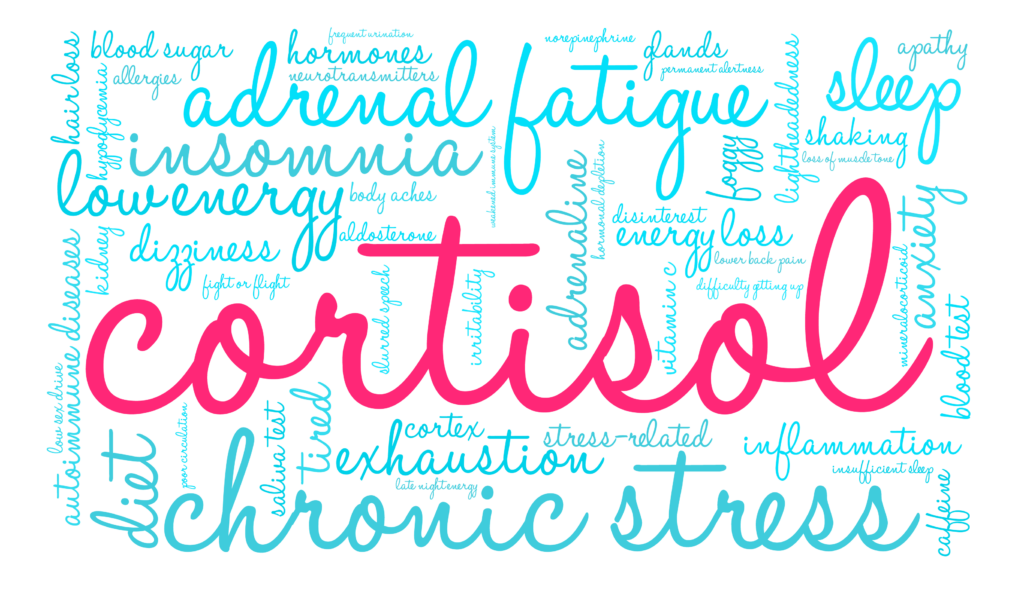
Cortisol & Mental Health.
Cortisol & mental health: there is a very strong connection. Cortisol is often known as the stress hormone, and it is associated with the fight or flight response. Increased cortisol during stress is normal, but the problem is that our primal bodies don’t know the difference between normal everyday stressors and the stress of imminent danger.
This hormone is produced by our adrenal glands, the small endocrine glands that sit on top of our kidneys. Cortisol plays an important role in everything from how the body uses glucose (sugar), to the regulation of blood pressure, to the function of the immune system.

Cortisol has a lot of benefits: it provides energy in the event of trauma, prepares us for mental and physical challenges, and supports our immune system. However, when increased levels of cortisol are present, we can experience weight loss resistance, anxiety & depression, high blood pressure, high blood sugar, etc.

Mental Health is the Unspoken Pandemic.
In today’s society, we are confronted with so many abnormal stressors. Many people are unemployed right now, causing additional financial stress. The inability to socialize has caused a rise in depression. The constant stream of unknowns is hard for anybody, regardless of their station.
To sum it up, times are freaking hard, y’all. And it’s no surprise that during all this unknown, mental health is taking a serious hit for millions of people around the globe. Cortisol & mental health…see how the two are pretty connected?
20% off Care.com Premium Membership when you find a housekeeper, house cleaner, deep cleaner today!Insert cortisol & mental health. With all the problems that can be linked to mental health, there is a distinct correlation to the rise of cortisol levels in many. Not only are anxiety and depression an issue, but we have to think about all the other health factors that are subsequently related. Also, people with higher levels of cortisol are less likely to respond to psychotherapy, meaning the addition of more medications with unwanted side effects.

What can we do?
This article isn’t meant to be all gloom and doom. We’re facing tough times, but if we can do our best to take care of ourselves, we will come out on the other side even better and stronger than we were going into all this. Here are a few tips to stabilize your cortisol levels and optimize your mental health.
- Exercise: Daily activity has been shown to reduce our cortisol levels and actively combat mental health issues like anxiety & depression.
- Mediation: Calming our minds and acknowledging our thoughts can be extremely powerful for our mental health.
- Sleep: Quality sleep is the most important tool we can use to keep our brains and bodies functioning at their best. REM sleep is vital to ensuring our brains recharge during the night.
- Get Outside: Sunlight exposure is a great way to increase vitamin D levels and boost our mood.
- Supplementation: We now have access to supplements that are specifically designed to stabilize cortisol, boost mood, and target the communication between our guts (our 2nd brain) and our brains.

There’s a lot that we can do to combat stress and normalize our cortisol & mental health. We just have to be proactive and take better care of ourselves. You are worth it!
Even if you just take small steps toward prioritizing your mental health, the payoff can be huge! Do whatever you can to be the best version of yourself. No one is perfect, but we can all strive to be just a little bit better!
A note to moms: you need to take care of yourself to be the best version of you for your babies. Prioritizing yourself is not selfish, in fact, it is one of the most selfless things that you can do as a mother. I promise.

Great article! I recently listened to a book that talked about how stress is behind 95% of illness, from the common cold to cancer. I was amazed! Your article does a great job of presenting solutions.
Such An informative post!